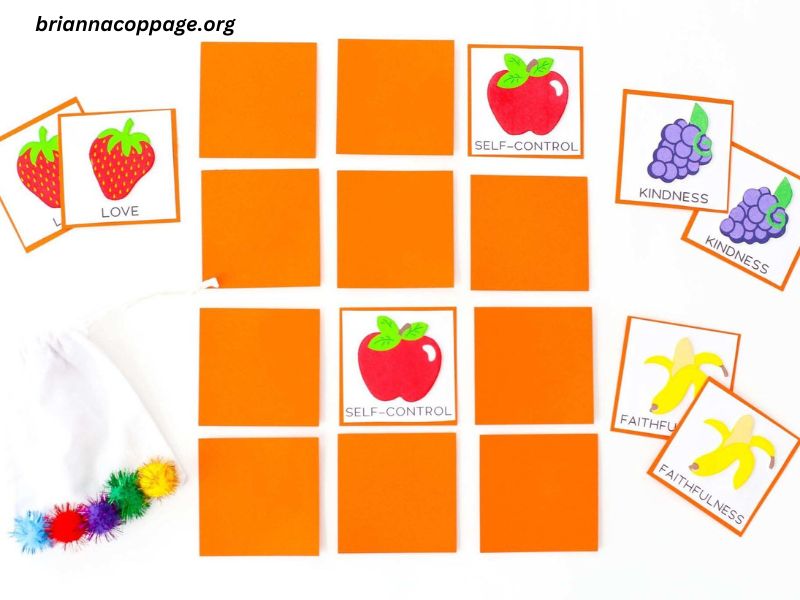The Fruits of the Spirit, a well-known concept in Christian theology, are qualities that reflect the transformative work of the Holy Spirit in the lives of believers. These attributes, as outlined in the New Testament in Galatians 5:22-23, serve as markers of spiritual growth and are essential in living out a Christ-like life. While these virtues are intangible, comparing them to physical fruits can provide a deeper understanding of their significance and the role they play in Christian life.
In this article, we will explore the Fruits of the Spirit and match each one with a corresponding fruit, symbolizing the essence of each spiritual quality. This comparison not only offers a unique perspective but also emphasizes the importance of cultivating these fruits within our own lives.
1. Love – The Sweetness of an Apple
The first Fruit of the Spirit is love, the foundational Christian virtue that encompasses compassion, kindness, and unconditional care for others. In 1 Corinthians 13, Paul describes love as patient, kind, and not envious or boastful. It is the root of all other virtues because, without love, the other fruits would not exist.
When we think of love in the natural world, the apple is a perfect metaphor. Apples are sweet, refreshing, and universally adored for their pleasant taste and accessibility. Similarly, love is the quality that makes all relationships sweet and desirable. Just as an apple nourishes the body, love nourishes the soul and brings harmony in relationships.
2. Joy – The Zest of Oranges
Next, we have joy, which is more than happiness. Joy is a deep sense of delight that transcends external circumstances. Joy is often described as a gift from the Holy Spirit, rooted in knowing God’s grace and love. Even in difficult times, joy provides a constant undercurrent of peace and gladness.
The orange is an ideal representation of joy. Known for its vibrant color and tangy flavor, oranges offer a burst of energy with each bite. Just as an orange revitalizes the senses, joy rejuvenates the spirit. The bright, sunny hue of an orange can remind us of the cheerful disposition that the joy of the Lord imparts into our lives.
3. Peace – The Calm of a Pear
Peace is another essential fruit of the Spirit, symbolizing a sense of tranquility and wholeness that only God can provide. In John 14:27, Jesus promises peace that the world cannot give. This peace is not the absence of conflict but an inner calm that remains regardless of life’s circumstances.
The pear represents peace. Pears have a smooth, tender texture that is both satisfying and calming to the senses. They do not have the bold or overpowering qualities of other fruits but are instead gentle and soothing. Pears symbolize the quiet peace that settles in the heart, making them a fitting analogy for this important Fruit of the Spirit.
4. Forbearance (Patience) – The Steadiness of Bananas
Patience, often referred to as forbearance in the Bible, is the ability to endure difficult situations without frustration or complaint. It is the ability to wait for God’s timing and to show grace to others even when they may not deserve it. In James 5:7-8, believers are urged to be patient and wait for the Lord’s coming, just as a farmer waits for the harvest.
The banana is a great representation of patience. Bananas, unlike other fruits that may ripen quickly, take time to mature. They grow steadily, changing from green to yellow, a process that requires patience. Bananas teach us that there is value in waiting and that patience yields the sweetest results.
5. Kindness – The Tenderness of Mangoes
Kindness is an expression of generosity and compassion toward others. It is the ability to treat others with respect and empathy, showing care without expecting anything in return. In Ephesians 4:32, Paul calls believers to be kind to one another, forgiving as God forgave them.
The mango perfectly symbolizes kindness. Known for its juicy sweetness and tender texture, mangoes are a fruit that evokes warmth and comfort. Just as a mango is pleasing to the palate, kindness brings comfort to the soul. Its ability to soften hearts makes it a fitting metaphor for the kindness that the Holy Spirit calls believers to practice in their daily lives.
6. Goodness – The Purity of Grapes
Goodness is moral integrity and uprightness in every area of life. It is the desire to do what is right in God’s eyes, even when no one is watching. As Paul writes in Romans 12:21, believers are called to overcome evil with good, reflecting the goodness of God in their actions.
The grape is an excellent representation of goodness. Grapes are often associated with purity and sweetness, and they grow in clusters, symbolizing the collective goodness that flows from a righteous life. The process of making wine from grapes is one that takes time and care, much like cultivating goodness in one’s life. Just as grapes transform into something richer, our goodness reflects God’s holiness.
7. Faithfulness – The Dependability of Pineapples
Faithfulness involves loyalty, trustworthiness, and the ability to be dependable. It is a reflection of our commitment to God and others, staying true to our promises and covenant relationships. Jesus’ faithfulness is the ultimate model for believers, and it is a fruit that grows as we continue to rely on God’s grace and mercy.
The pineapple is a perfect analogy for faithfulness. Known for its tough exterior and sweet, consistent interior, the pineapple stands as a symbol of dependability. Just as a pineapple requires patience to peel, its rewards—its sweetness—are worth the effort. Similarly, the fruit of faithfulness may require effort, but the results are long-lasting and dependable.
8. Gentleness – The Softness of Peaches
Gentleness is the ability to be considerate and tender in our interactions with others. It involves humility, meekness, and a calm spirit. In Philippians 4:5, Paul encourages believers to let their gentleness be evident to all. Gentleness can soften hard hearts and create an environment of mutual respect.
The peach embodies gentleness with its soft, velvety skin and sweet, tender flesh. It is not harsh or abrasive but instead gentle and inviting. Just as a peach’s delicate texture requires careful handling, so too does gentleness require intentionality in our words and actions.
9. Self-Control – The Restraint of Lemons
Finally, self-control is the ability to restrain one’s desires and impulses in the face of temptation. It is about mastering our appetites and emotions and submitting them to the will of God. Galatians 5:23 lists self-control as one of the Fruits of the Spirit, indicating its essential role in living a godly life.
The lemon represents self-control. Lemons are known for their tartness, which can be overwhelming if consumed in large amounts. They require moderation, just like self-control. When used appropriately, lemons can enhance a dish, but in excess, they can ruin the taste. Similarly, self-control allows us to manage our impulses, leading to a balanced and fruitful life.
The Importance of Cultivating the Fruits of the Spirit
Just as a gardener nurtures the growth of fruit trees, believers are called to cultivate the Fruits of the Spirit in their lives. These qualities are not produced overnight but require continuous attention, prayer, and submission to the Holy Spirit. In Galatians 5:25, Paul writes, “Since we live by the Spirit, let us keep in step with the Spirit.” Cultivating these fruits requires a daily commitment to living in alignment with the Holy Spirit’s work within us.
Conclusion
Matching the Fruits of the Spirit with physical fruits provides a unique and tangible way to understand their role in our spiritual journey. Each fruit—from the sweetness of love to the restraint of lemons—offers valuable lessons on how to embody these virtues in our daily lives. As we strive to bear the Fruits of the Spirit, we are reminded that, like fruit trees, our spiritual growth requires care, patience, and dedication. When we cultivate these qualities, we reflect the character of Christ and become more effective witnesses of His love and grace to the world.





